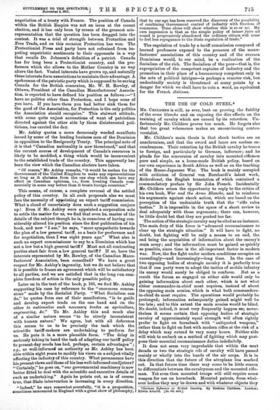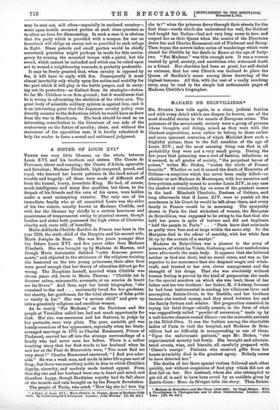THE USE OF COLD STEEL.*
MR. CHILDERS is still, as ever, bent on proving the futility of the arme blanche and on exposing the dire effects on the training of cavalry which are caused by its retention. Un- fortunately Mr. Childers proves too much. He forgets also that too great vehemence makes an unconvincing contro- versialist.
Mr. Childers's main thesis is that shock tactics are an anachronism, and that the sword and lance are useless en- cumbrances. Their retention by the British cavalry he traces to foreign, and particularly to German, influence ; and he pleads for the conversion of cavalry into mounted riflemen pure and simple, as a home-made British policy, based on our own experience in South Africa as well as on the teaching of the Russo-Japanese War. The book is mainly occupied with criticism of General von Bernhardi's latest work, Beiterdienst, the English translation of which contained a commendatory preface by Sir John French. Incidentally Mr. Childers seizes the opportunity to reply to the critics of his own book, War and the Arms Blanche, and to reinforce his arguments against shock action, which are based on the perception of the undeniable truth that the "rifle rules tactics." It is impossible in the space of a short review to deal adequately with those arguments ; there can, however, be little doubt but that they are pushed too far.
The action of the strategic cavalry may be cited as an instance. The main duty of this force is " advanced reconnaissance to clear up the strategic situation." It will have to fight, no doubt, but fighting will be only a means to an end, the end being the acquisition of information about the enemy's main army ; and the information must be gained as quickly as possible, since time is the all-important factor in modern war. Now, the fire fight under modern conditions occupies an exceedingly—and increasingly—long time. In the case of two opposing bodies of strategic cavalry it is perfectly true that if one party were to adopt the tactics of mobile infantry its enemy would surely be obliged to conform. But as a result the forces so engaged on either side would only be gaining information about each other, which is not what either commander-in-chief most requires, instead of about the opposing main armies, which is what both commanders- in-chief do most require. The operations would probably be prolonged; information subsequently gained might well be too late ; and to this extent the main armies would be blind. No doubt, indeed, it must very frequently happen so; never- theless it seems certain that opposing bodies of strategic cavalry of approximately equal strength will often rightly prefer to fight on horseback with " antiquated weapons," rather than to fight on foot with modern rifles at the risk of a delay which may extend to very many hours. Neither side will wish to embark on a method of fighting which may post- pone their essential reconnaissance duties indefinitely.
It does not seem very improbable that within the next decade or two the strategic role of cavalry will have passed mainly or wholly into the hands of the air corps. It is in this direction that the future of the aeroplane lies marked out. In that future time there may come to be little reason to differentiate between the cavalryman and the mounted rifle- man. Yet even then mounted troops will still require some weapon for use on horseback. Mounted patrols, from what- ever bodies they may be drawn and with whatever objects they
• German Influence on British Cavalry. By Erskine Childers. London g Edwin Arnold. [3s. 6d. net.]
may be sent out, will often—especially in enclosed country— come upon hostile mounted parties at such close quarters as to allow no time for dismounting. In such a case it is obvious that the party which is provided with a weapon for use on horseback will oblige an enemy not so provided to seek refuge in flight. Since patrols and small parties would be chiefly concerned, provision might perhaps be made for this contin- gency by arming the mounted troops with a pistol, but the sword, which cannot be unloaded and which can be relied upon not to wound a neighbouring comrade, is probably preferable.
It may be freely granted that, when cavalry is opposed by fire, it will have to reply with fire. Consequently it must almost inevitably rely wholly upon fire action and mobility for the part which it will play in the battle proper, and in carry- ing out its protective—as distinct from its strategic—duties. So far Mr. Childers is on firm ground ; but it would seem that he is wrong in advocating the abolition of the white arm. The great body of scientific military opinion is against him, and it is an interesting point that the Japanese cavalry policy runs directly counter to the deductions which be would have us draw from the war in Manchuria. His book should be read as an interesting contribution to the literature of one aide of the controversy on the future of cavalry; alone, and without the statement of the opposition case, it is hardly calculated to help the reader to form a sound and unbiassed judgment.







































































 Previous page
Previous page